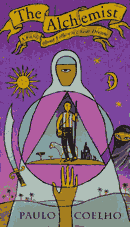
Dreams, symbols, signs, and adventure follow the reader like echoes of ancient wise voices in "The Alchemist", a novel that combines an atmosphere of Medieval mysticism with the song of the desert. With this symbolic masterpiece Coelho states that we should not avoid our destinies, and urges people to follow their dreams, because to find our "Personal Myth" and our mission on Earth is the way to find "God", meaning happiness, fulfillment, and the ultimate purpose of creation. The novel tells the tale of Santiago, a boy who has a dream and the courage to follow it. After listening to "the signs" the boy ventures in his personal, Ulysses-like journey of exploration and self-discovery, symbolically searching for a hidden treasure located near the pyramids in Egypt. When he decides to go, his father's only advice is "Travel the world until you see that our castle is the greatest, and our women the most beautiful". In his journey, Santiago sees the greatness of the world, and meets all kinds of exciting people like kings and alchemists. However, by the end of the novel, he discovers that "treasure lies where your heart belongs", and that the treasure was the journey itself, the discoveries he made, and the wisdom he acquired. "The Alchemist", is an exciting novel that bursts with optimism; it is the kind of novel that tells you that everything is possible as long as you really want it to happen. That may sound like an oversimplified version of new-age philosophy and mysticism, but as Coelho states "simple things are the most valuable and only wise people appreciate them". As the alchemist himself says, when he appears to Santiago in the form of an old king "when you really want something to happen, the whole universe conspires so that your wish comes true". This is the core of the novel's philosophy and a motif that echoes behind Coelho's writing all through "The Alchemist". And isn't it true that the whole of humankind desperately wants to believe the old king when he says that the greatest lie in the world is that at some point we lose the ability to control our lives, and become the pawns of fate. Perhaps this is the secret of Coelho's success: that he tells people what they want to hear, or rather that he tells them that what they wish for but never thought possible could even be probable.
No comments:
Post a Comment